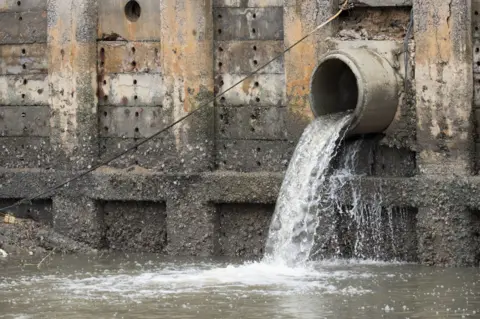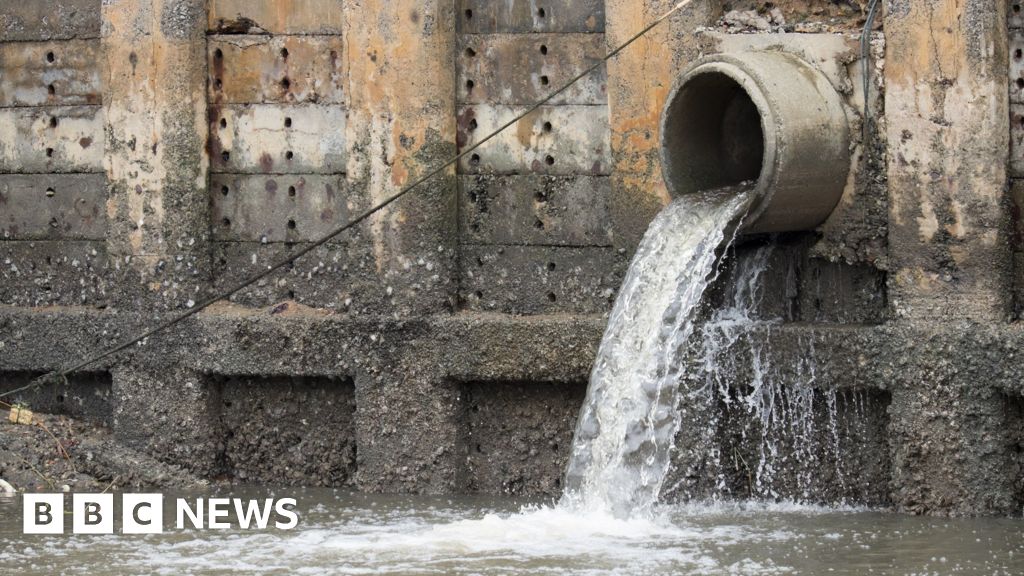Climate and science reporter
Environment correspondent
 Getty Images
Getty ImagesWater companies released raw sewage into England’s rivers and seas for a record 3.61 million hours last year, a slight increase on 2023.
The data released by Environment Agency on Thursday showed that although the number of spills was down each spill lasted longer on average – resulting in a higher total number of hours.
Some spilling can be legal, but concern has been mounting amongst scientists about the harm that regular sewage spilling is causing the country’s aquatic life.
Water UK, the industry body, said sewage spills are a “disgrace” but has committed to a programme of investment worth £104bn over the next five years.
“These figures are disgraceful and are a stark reminder of how years of underinvestment have led to water companies discharging unacceptable levels of sewage into our rivers, lakes, and seas,” said Environment Secretary Steve Reed.
His views were echoed by Water UK Chief Executive David Henderson: “Any sewage flowing into waterways is a disgrace. Unfortunately, it’s a system fault that we have in our network which mixes rainwater and wastewater. Nobody wants to see any spill of sewage in our waterways.”
England, like much of the world, has a combined sewage system meaning that rainwater and sewage share the same pipes. In some instances, when there is too much rain, treatment works can be overwhelmed, and sewage is spilled via overflow points into the country’s rivers, lakes and seas to prevent a back up to the system.
This practice is legal. But previous investigations by the BBC and Environment Agency have revealed that sewage has also been spilled by water companies under dry conditions in breach of their permits.
Water companies collectively oversee more than 15,000 of these overflow sites and this was the first year where all sites were monitored, revealing for the first time the extent of spilling.
Sewage was spilt for 3.614 million hours in 2024 compared to 3.606 million hours in 2023.
CEO of River Action, James Wallace, said: “A year on from last year’s catastrophic pollution figures, the true scale of the UK’s water crisis is only now coming to light. The figures have barely budged, testament to the deepening sewage scandal.”
In 2022, Prof Chris Whitty, chief medical office for the UK, outlined the serious health risks sewage spills can pose for those using the country’s waterways. Chief amongst them is bacteria from human faeces which he said can “increase the risk of significant infections including antibiotic resistant bacteria”.
Sewage also poses significant environmental risks – it increases nutrients in the water leading to algal blooms which then eventually denies other wildlife – like fish – oxygen. These spills also have been shown to introduce microplastics, drugs and sanitary products into rivers and seas.
The River Ver in St Albans is one such location – the banks are littered with condoms, tampon applicators and wet wipes likely from sewage releases from nearby Markyate sewage treatment works owned by Thames Water. This rare chalk stream – one of around 200 worldwide – which supports important wildlife like water voles, saw more than 3,300 hours of spills in 2024.
Of the spills a Thames Water spokesperson said: “The Markyate area experienced one of the wettest years on record in 2024 which has caused excessive amounts of groundwater which has infiltrated into the network. This has resulted in the system being overwhelmed which has led to discharges into the river.”
Liberal Democrats Leader Ed Davey said the scale of spilling showed that the sector regulator, Ofwat, was not up to the task.
“This has to be the final nail in the coffin for Ofwat, a regulator that has time and again proven it is completely inadequate to protect customers and our beautiful environment,” he said.
In October, the government launched an Independent Water Commission, chaired by former deputy Bank of England governor Sir Jon Cunliffe, to look into the sector – including the effectiveness of Ofwat.
An Ofwat spokesperson said: “Where companies miss their targets, they will be penalised and money will be returned to customers. In parallel, companies will be held to account for past failures through our ongoing enforcement work into the operation and maintenance of sewage works and networks.”
The Markyate site is one of a number across the country that is due an upgrade as part of a five-year £104bn investment programme by water companies – with £24bn going specifically to improving infrastructure.
These upgrades will be paid largely through bill rises – which are due to take effect from 1 April – and will see the average annual bill hit £603. This has angered consumer groups and environmental charities who argue that the burden of upgrades should be carried by shareholders not households.
Prof Ewan McGaughey, Professor of Law at Kings College London, said: “The water companies have paid over £85bn out to shareholders since privatisation and that means they haven’t been able to put the money into infrastructure.”
Ofwat and the industry have previously denied the figure– which comes from University of Greenwich research – is as high, but there is agreement that significant investment is required.
Phillip Clisham, specialist adviser to the Institution of Civil Engineers on water and sanitation, has worked in the industry for more than three decades, and said the challenge of fixing the issue has been “underestimated”.
He said the two main solutions are building bigger storm tanks – which produce a huge amount of planet warming emissions in their construction – or to reduce excess rainwater by increasing green areas and the use of sustainable urban drainage systems.
It is this second solution that is preferable for the environment, he said, but it requires coordination between government, planning officers and housing developers – and takes longer to implement.
“A lot of this work is not as easy as it might seem from the outside in reality.
“I think it would be preferable for me to go a bit slower, get it right. But politically there’s an awful lot of pressure to fix things now, and I do worry about the next 5 years,” he said.
Additional reporting by Becky Dale, Rob England and Erwan Rivault

